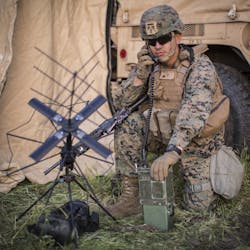Army picks nine companies to help stave-off obsolescence and boost cyber security in C5ISR procurements
ABERDEEN PROVING GROUND, Md. – U.S. military logistics experts are asking nine defense companies to help the U.S. Army solve potential problems caused by rapid modernization in command, control, computers, communications, cyber, intelligence, surveillance and reconnaissance (C5ISR) systems.
Officials of the U.S. Defense Logistics Agency Land and Maritime segment at Aberdeen Proving Ground, Md., on Thursday announced contracts potentially worth $3.2 billion over the next 10 years for the C5ISR Gateway to Sustainment (G2S) project.
Each of the nine G2S contractors will supply commercial and noncommercial items and services to support C5ISR projects of the U.S. Army Communications and Electronics Command (CECOM) at Aberdeen Proving Ground, Md.
This program is intended to solve and prevent potential problems during rapid modernization. Vendors will compete to sustain a system early in its life cycle, to include hardware, software, engineering, obsolescence mitigation, and depot partnering.
The G2S contractors are:
-- Amentum Services Inc. in Germantown, Md.;
-- Science Applications International Corp. (SAIC) in Fairfield, N.J.;
-- Centuria Corp. in Reston, Va.;
-- STS International Inc. in Berkeley Springs, W.Va.;
-- L3Harris Communications Systems-West in Salt Lake City;
-- Micro USA Inc. in Poway, Calif.;
-- Atlantic Diving Supply Inc. in Virginia Beach, Va.;
-- Fairwinds Technologies LLC in Annapolis, Md.; and
-- Telecommunications Systems Inc. in Annapolis, Md.
Related: Raytheon to fix software problems in Air Force cyber security and cryptographic system
These are five-year base contracts with five one-year option periods. Locations of performance are inside and outside the continental U.S., with an April 5, 2028, performance completion date. Sixteen companies submitted proposals for the project.
These companies will provide items and services related to test, evaluation, and repair; upgrade, engineering, and design-changes; engineering studies and capability analyses; obsolescence monitoring; and hybrid contractor support.
The companies will provide equipment and services such as networking hardware and software; handheld and portable radios; fixed and mobile secure and non-secure voice, video, and data networks; data processing; networking and data transmission such as satellite terminals.
Related: Lockheed Martin to provide cyber security for Navy C-130T avionics
Work also will involve tactical cyber operations; enterprise systems; electronic warfare (EW); radar- and missile-warning receivers and countermeasures; mine detection; intelligence, surveillance, reconnaissance and targeting; sensors such as night-vision equipment; radar; positioning, navigation and timing (PNT); power systems; environmental control; air traffic control; and avionics.
The goal is to give the G2S contractors the opportunities to have U.S. Department of Defense-level engagement; and to partner with up-and-coming technology companies on supply-chain issues to support emerging technologies for the warfighter.
The contract also involves obsolescence monitoring and mitigation for review and approval of form, fit, and function replacement parts. These are five-year base contracts with five one-year option periods. Using customers are Army Communications-Electronics Command, Defense Logistics Agency, Department of Defense and federal civilian agencies.
About the Author
John Keller
Editor-in-Chief
John Keller is the Editor-in-Chief, Military & Aerospace Electronics Magazine--provides extensive coverage and analysis of enabling electronics and optoelectronic technologies in military, space and commercial aviation applications. John has been a member of the Military & Aerospace Electronics staff since 1989 and chief editor since 1995.
